The Mr. Robot series finale aired just in time for Christmas, which is fitting given that the season has been a kind of extended Christmas special. I do think it is something of a shame, however, that the two episodes aired back to back on the same night. It would have been fun to have a week in between them for theorizing and conversation instead of immediately having the interpretation of S4E12 colored by the events of S4E13.
And it would appear that the two episodes have names, even though they were originally listed as “Series Finale Part 1” and “Series Finale Part 2.” I’m thankful for this, as the episode titles in Mr. Robot have generally been interesting, and this has especially been the case in Season 4. There are no 4xx client error codes here (and there wasn’t last week either, though I’ve left my mistake in place—411 Caemeron Error). S4E12 is titled “whoami” and S4E13 is “Hello, Elliot.” Both titles strike me as fitting.
whoami
S4E11 ended with Elliot coming home to find Elliot at his computer (sorry, this is going to get confusing—I’ll do my best) after following him in the new reality we were introduced to towards the end of the episode for some 15 minutes. There are quirks about this reality that I noted last week: the time is always 11:16, Zhang’s foundation is called Whiterose even though the event that led her to take the name would never have happened if her plan were successful, Darlene is nowhere to be found, etc.
So even if my initial reaction was that Whiterose’s plan worked, perhaps that was because I wanted it to more than anything else. Yet though S4E13 seems to definitively inform us that this reality isn’t “real,” there are certain things that make the question somewhat murky.
The biggest among these would be the sketches that Elliot has on his computer of other Elliot, Darlene, Romero, Trenton, and Mobley. At least for a moment, the door is cracked to the idea that this new reality might be the real one, and the world we’ve been observing the fantasy. Certainly there have been things that have strained credulity in this narrative and the whole idea of the hack(s) feels a bit fantastic from the perspective of the reality we’re living in.
Yet, at the end of the day, as we enter this new world now through the perspective of our friend Elliot (as opposed to new-Elliot), it becomes ever clearer that this is the fiction. It is not only always 11:16, but always May 9th.
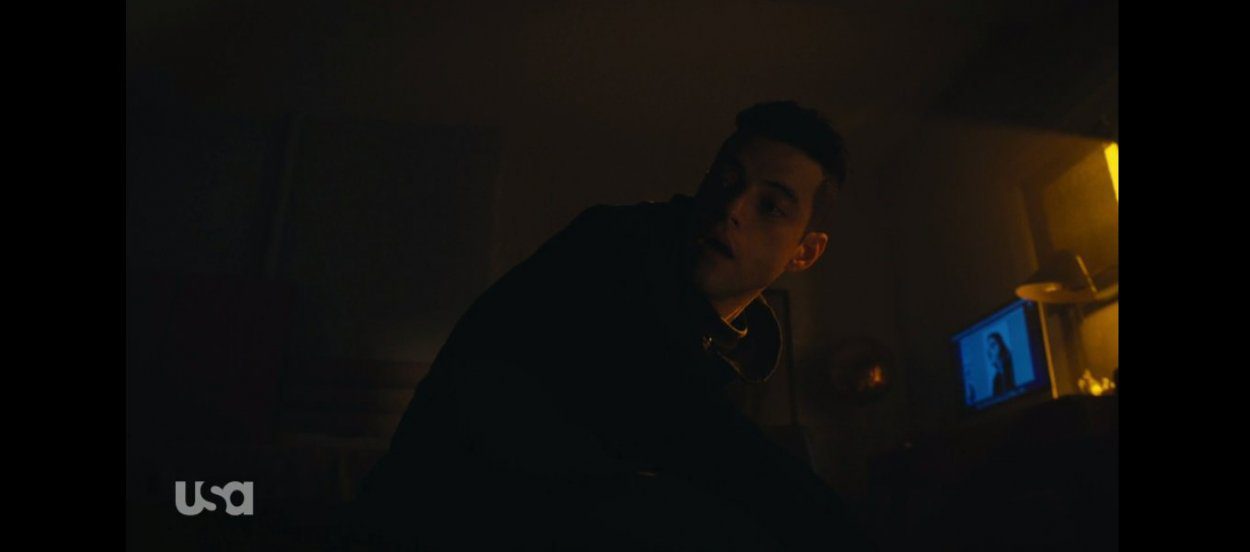
Ne Me Quitte Pas
An earthquake may have led to his head injury, but when it comes down to it, our friend kills new-Elliot. I think you should look away, too.
Of course, this wasn’t “real” but what is real? Our categories risk being too facile. Perhaps this is a drama in Elliot’s mind, but does that mean it didn’t happen? What does it mean “to happen”? What does it mean for something to be real?
Certainly our internal dramas and struggles are real from the point of view of how they affect us. What could be more real than this aspect of my lived experience where I grapple with my sense of self and my place in the world? This desk? Why? Just because it is a material thing as opposed to something psychological?
And what of meaning itself? It’s a strange thing, if you think about it, that these words I am typing can set off thoughts in your head—ink on a page, or I guess fonts on a screen. It’s not the materiality of the letters that does it; it’s something else. These words have meaning to you. They inspire thought. And what is thought? You can correlate it to brain states all you want and it still doesn’t really answer the question.
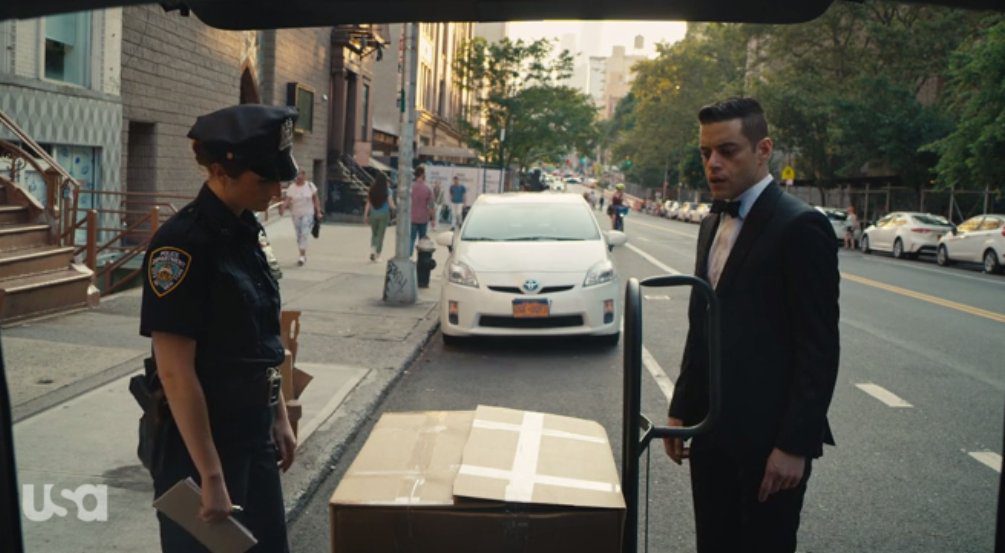
When Dom the cop asks for Elliot’s ID, she says, “This person is nothing like you.” At first I thought she said, “this person looks nothing like you” which would have been weird, but that’s not it. Rather, this is our friend’s mind telling him that he’s not the one he killed, and that he doesn’t belong there.
Come On, This Only Works If You Let Go Too
S4E13, the Mr. Robot series finale, centers on Elliot’s psychology. After he goes to Coney Island to get married and encounters a bunch of people in fsociety masks, “Angela” tells him he isn’t Elliot but “the mastermind” and he encounters a bunch of people with Christian Slater faces in a scene that feels like it is right out of Being John Malkovich.
All of this is on the path to him realizing that he isn’t the “real” Elliot. It turns out “the other one” is the one we have been following all along. This aspect of Elliot’s psyche took over however many months ago, and has been the one carrying out all of these plans. This also potentially explains the moment when Darlene seems to address Mr. Robot directly in S4E11. Perhaps it is “the other one” who has grown on her.
I think it is important that when this other one says that he isn’t the real Elliot, but just a part of him, that we put the emphasis on part of him. All of these personalities are a part of Elliot, even if the “real” Elliot has been submerged for a while.
Dissociative Identity Disorder is a strange and controversial thing.
But at the end of the day, it would seem that this is what Mr. Robot is about. It’s not about a hacker who sees the massive wealth inequality in the world and uses his skills to take it down. It’s not about the possibility of other worlds, as represented through Whiterose’s project. Mr. Robot is, first and foremost, about Elliot Alderson.
Domo Arigato
The inspiration for the show was hiding in plain sight all along:
“The other one” was the one we have known all along. There was no third personality waiting in the wings to be revealed, as many thought. The Elliot we’ve known we’re told is not Elliot, but “the mastermind.” Whatever I think of the moniker (and to be honest, I’m not a fan), this calls back to the earlier scene where Angela was cut off after the letter M, so I’ll allow it.
But how, then, do we interpret what has happened with Elliot’s psyche?
“Krista” spells it out for us fairly well: he created Mr. Robot to protect him, and then the imago of his mother as a persecutor and younger self as a version of himself who could deal with it. (But I do have a question here: what did Magda actually do?) Later, “the mastermind” emerged, embodying Elliot’s rage at the world, and his fantasies about changing it. Elliot’s just a man who needed someone (“the mastermind”) and somewhere to hide (the fake reality) to keep him alive. He is the modern man.
Darlene indicates that all of the hacks really happened, and that Whiterose is dead. She wasn’t in the fantasy world because she is too much of a link to reality for Elliot, according to “Krista” and I think that tracks. We’ve never been told precisely whether Darlene was abused as well, but I think it’s safe to guess that she was—whether by their father, or their mother, or both. So she couldn’t be in the “real” Elliot’s fantasy world—she represents too much of a connection to the events our friend is trying to shelter him from.
Hello, Elliot
The end of Mr. Robot’s series finale seems to me to involve a reintegration of Elliot’s consciousness. All of these parts of himself—from Mr. Robot to Magda, the Young Elliot, and “the other one”—seem to be coming together as he emerges to consciousness. And that’s a happy ending.
It’s also a bit of a fantasy to think that Elliot will just be OK from this point forward. He has problems, and that version we saw of him in another world wasn’t the true Elliot any more than anything else we’ve seen.
The discontent and the rage that we’ve seen from our friend is a part of Elliot, as he says. It’s not like this is a wholly different person. It’s an aspect of him, as is Mr. Robot—as are the others.
And so I think this is where Mr. Robot leaves us: these various aspects of Elliot’s self have been reintegrated into one. He has traversed the fantasy and come back to himself. But to think that he’s all better would be its own kind of fantasy. As Darlene said, in a world like this isn’t it crazier to not have panic attacks?
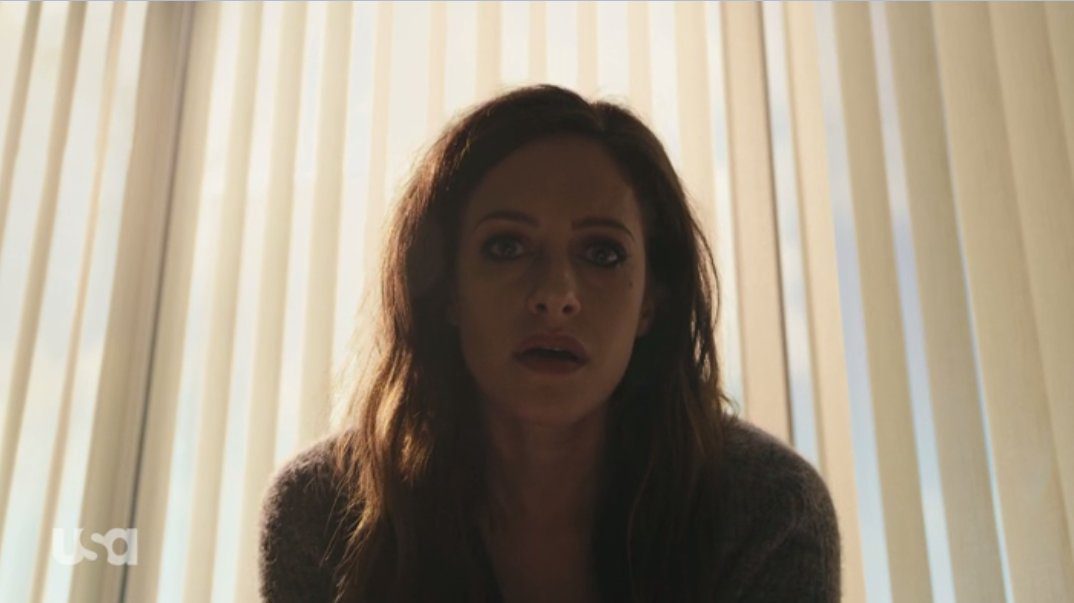
And, yet, she’s there for him. She is his connection. Perhaps it is their shared trauma that does the trick. And that raises a question, which is the one I think Mr. Robot leaves us with: would you prefer a world that is peachy keen where everything seems to be going well, or this one—with all of its pain—where at least you’re not alone?
Addendum
Overall, I think that Mr. Robot has provided us with an excellent series finale. It makes sense that in the end the story is about Elliot’s psyche, and the execution was fantastic. However, I do have a bit of an issue with the monologue Elliot gives right towards the end:
This whole time, I thought changing the world was something you did, an act you performed, something you fought for.
I don’t know if that’s true anymore.
What if changing the world was just about being here, by showing up no matter how many times we get told we don’t belong, by staying true even when we’re shamed into being false, by believing in ourselves even when we’re told we’re too different? And if we all held on to that, if we refuse to budge and fall in line, if we stood our ground for long enough, just maybe the world can’t help but change around us.
This doesn’t quite fit right within the narrative. This is a world where Elliot (or “the mastermind”) did do something to meaningfully change things. The fallout from 5/9 may have been bad, with the rich and powerful Deus Group finding a way to maintain or even expand their power, but the effects of the Christmas Day hack seem to have been to the good. Wealth seems to have been redistributed to level the playing field, and cadre of the Deus Group meaningfully taken out. Whiterose is dead, and while that doesn’t necessarily mean there will be no more Dark Army, it may well mean that. After all, it is hard to see them continuing to be willing to kill themselves on a dime without the faith in Whiterose’s project.
So what sense does it make for Elliot to tell us that changing the world isn’t about fighting for something, but just about being here and staying true even when we’re being shamed into being false, etc.?
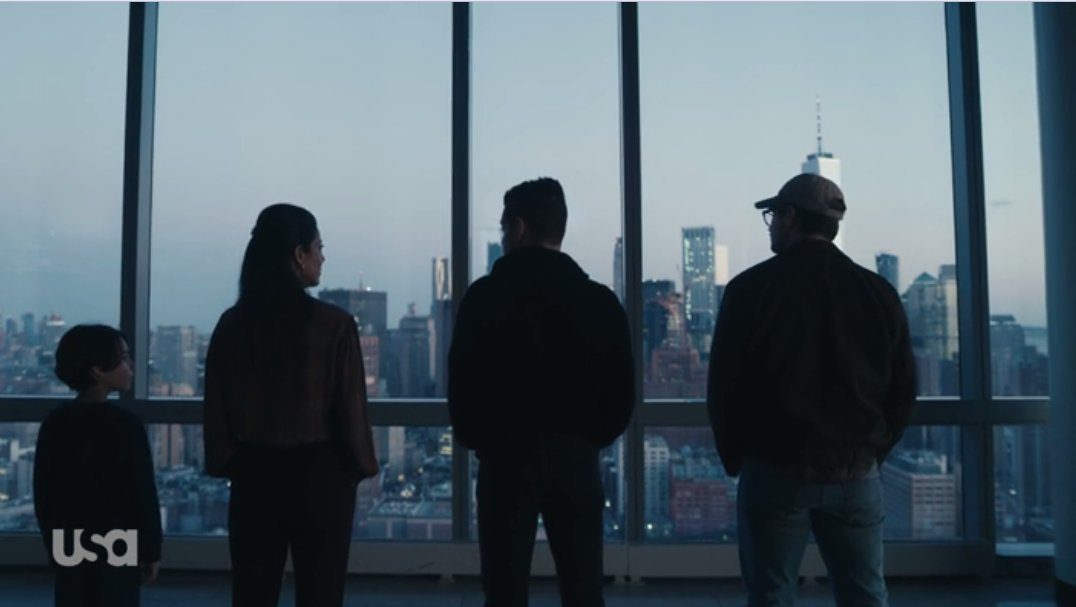
Throughout Mr. Robot, when Elliot has talked to us, it has been a matter of breaking the fourth wall in a novel way. Rather than his character breaking out of the narrative, the move has been to include us in it. And that continues in the finale, as when he tells us that this is only going to work if we let go too. But this monologue seems to be an exception. Here Elliot isn’t talking to us as the Friend implicated in his world. The message instead only lands in relation to our world—the real world where these hacks have not occurred.
It’s as if the ultimate message Mr. Robot wants to give us is that thinking we need to fight like “the mastermind” is a mistake. And certainly you could make that argument in relation to the narrative of the show, pulling in all of the carnage that stands in the wake of what he has done. A lot of people died.
But Mr. Robot doesn’t quite grapple with the question of whether it was worth it at the end of the day. And with the apparent success of the Christmas Day hack, that question should perhaps be a bit more fraught. Has he made the world a better place? If he and Darlene really have destroyed the forces of neoliberalism and freed humanity from the crony capitalism that defines our age; if they have really enacted this fantasy that many of us have had of wresting power from the “global elites” and giving it back to the people, might that not have been worth the sacrifice? Even of Angela?
On the other hand, if the idea is that the very same forces of capitalism and human nature will reassert themselves such that what “the mastermind” Elliot and Darlene did ultimately won’t matter, that’s pretty bleak, and this paean to authenticity falls a bit flat in relation to such a cynical possibility.
As it should in relation the reality we are living in. This idea that if we all stay true to ourselves the world will change around us is more of a fantasy than 5/9. It does nothing to combat the forces of late capitalism or the other problems we face in the world. After all, Trump’s supporters will praise him precisely for his authenticity. And we now have racists owning their racism as a matter of “being true to themselves.” The discourse of authenticity has a dark underbelly we’d do well to bear in mind. The ideas Elliot expresses are not new (they are almost cliché), and valuing authenticity has done little to nothing to change the world for the better.
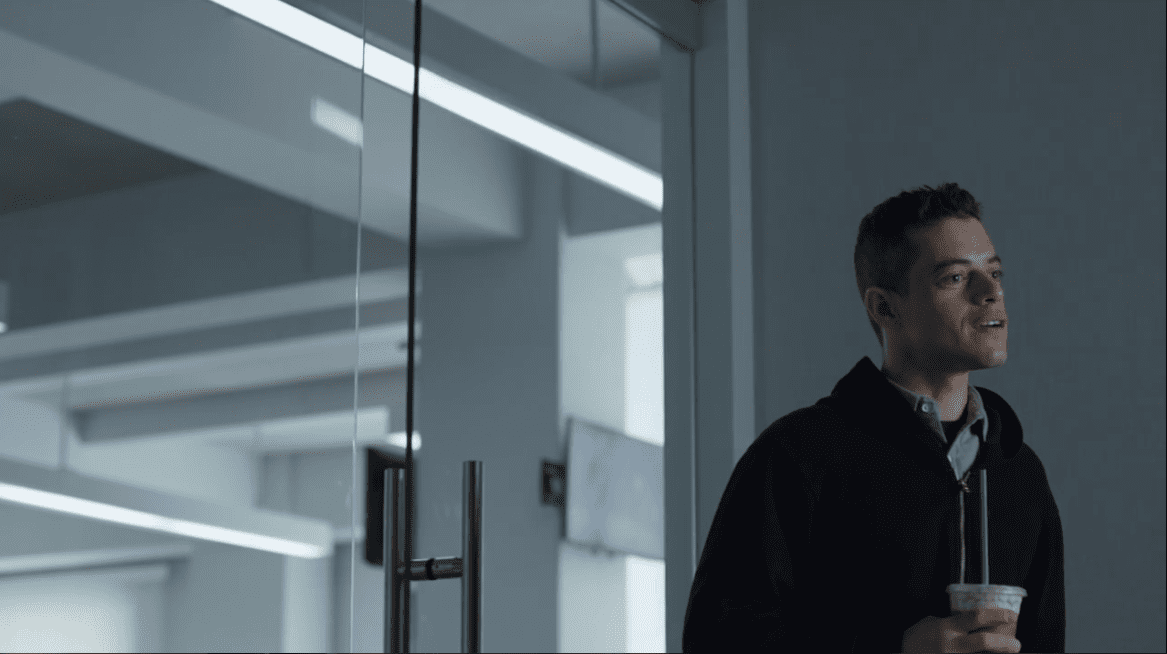
This is not to say that Elliot gives bad advice. Yes, keep showing up. Yes, stay true, and refuse to fall in line. Just don’t think that’s going to be enough to change the world.
This is where Mr. Robot risks quietism. The show seems to be saying, ultimately, that we shouldn’t get caught up on thinking about what to do to change the world, but instead just focus on being true to ourselves. And that’s dangerous.
Perhaps the idea of some grand hack that would set things right is a fantasy, but so is this suggestion Elliot leaves us with. One must do something. It’s hard to know what, looking at the world. Protests often seem fruitless. Engaging on social media can feel like screaming into the void. Electoral politics constrains us to the options on offer and even then it’s not clear we can trust the process. Thus we might fantasize about something like “Project Mayhem” or 5/9.
One of the strengths of Mr. Robot was that it looked at the aftermath of that, and the unintended consequences. It is perhaps a weakness that it didn’t do the same when it came to the events of Christmas Day.
But if the notion of pulling off one grand act to “save the world” is a fantasy, the notion of authenticity is its flipside. It’s the fantasy that being true to oneself and persevering is going to be enough. Perhaps that’s the best we can do. Keep going. Love those around you. And, “God damn it, you’ve got to be kind.” But that’s not going to change the world, even if it might make it tolerable to live in.
Perhaps Mr. Robot knows this, and one could read Elliot’s closing monologue along these lines: that he is swinging from one pole of a fantasy construct to another. But, again, the context feels off, since the Christmas hack seems to have worked, or at least we haven’t seen negative fallout from it as yet.
So it ultimately feels to me as though Esmail and Co. felt like something needed to be said in this space, and this was the best they could come up with. And I’m not saying I could do better, as this amounts to attempting to answer the question “What is to be Done?” in the context of late capitalism. But perhaps it would have been better to not even try, and to keep the focus on Elliot.





Redistribution of wealth would not be a good thing unless you are into economic collapse and eating your dog for food. I loved the series but the whole anti-capitalist shtick is getting kind of old to be honest. It is a system that has brought millions (if not billions) of people out of poverty that otherwise would still be in it.
Yes, I get it, Hollywood and our professors say it is bad and evil. However, you have to look at the source, they do not live in the “real world.” They could never hack it, that is why they work in universities and have bullshit degrees like gender study.
What I do agree with is how evil the current bastardized version of capitalism we have. We socialize the loses of corporations because they are “too big to fail.” We have people like Bernie Sanders that never did hack in the real world but become a millionaire with two homes and a supercar because he was able to bullshit a bunch of college kids into believing this tripe. Meanwhile, he has the balls to tell others about pollution and unfair wages for workers, lol.
We have both sides of the political aisle making themselves rich (and their relatives ::cough Biden ::cough) with tax payer money and funding endless wars. Yet, both sides have their bootlickers about how they are rebels against the “system” and the “man.”
Since when was rebellion about blindly following a political party and putting a strong government in place to push your ideals and interests? How can the Deus group have Donald Trump but not people like Obama that became more wealthy than any other president in the U.S. by simply winning two terms? How about Clinton riding the Lolita Express 26 different times with Epstein?
I wanted Mr. Robot to really be about change and going after the political system. To really go after ALL the 1%er’s but like any other bastardized hollywood tv/movie production it only goes after one side while licking the boots of the other.
Total disappointment that Sam Esmail is sadly a one time hack.